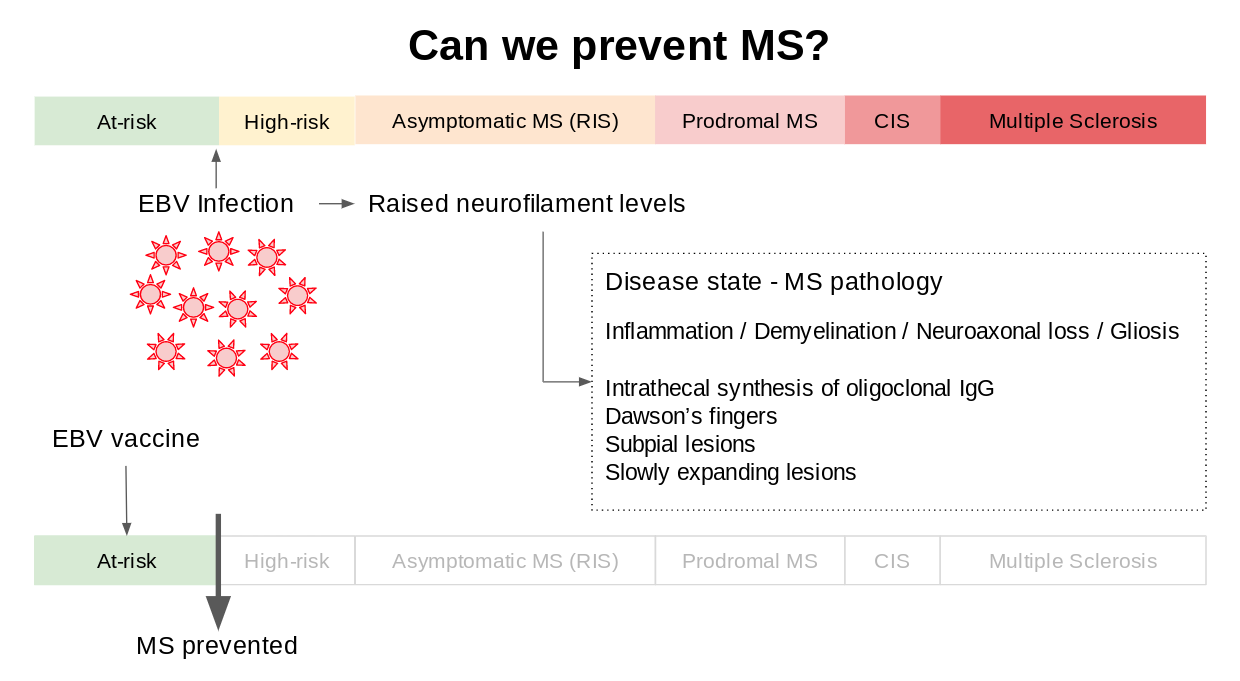Case study
Dear Professor Giovannoni
Firstly, thank you for your Newsletters. I find them very helpful and reassuring even if the ones on smouldering MS are frightening.
I am 33 years old married woman and have two young children; a daughter who is 4 and a son who is 18 months old. I know my children are at increased risk of getting MS. You have convinced me that EBV is the cause of MS and I don’t want my children to get MS.
Is there anything I can do to prevent them from being infected with EBV or anything else I can do to reduce their chances of getting MS?

Prof G’s Response
Yes, you are correct your children are at increased risk of getting MS. Your daughter has about a 1 in 40 chance of developing MS and your son has a 1 in 80 chance of developing the disease. Unfortunately, in relation to EBV, there is nothing we can do to prevent EBV infection at present. In the future, we hope to have a vaccine to prevent EBV infection and hopefully, by doing this we will be able to prevent your children and others who have the vaccine from developing MS and other EBV-related diseases in the future.
In terms of the other risk factors, I would simply suggest making sure your children are vitamin D replete, keeping them healthy and trying to prevent them from becoming overweight or obese. When they get older try and encourage them not to smoke, but that decision is often out of the hands of parents. Both my daughters smoked as teenagers despite my pleas for them not to.
In relation to the supplementary dose of vitamin D, I currently recommend that children under 2 years of age take 600 units of vitamin D3 per day, for 2-10-year-olds 2,000 units per day and for all children over 10 years and adults 4,000 units per day.
Please note that we have no direct evidence, from controlled trials, that vitamin D supplements will reduce the chances of your children getting MS. Please be aware that there are alternative theories regarding the strong association between low vitamin D levels and MS. A lot of people think that it is not low vD levels that are the risk factor, but lack of actual sunlight exposure. This is why we need vitamin D MS prevention trials to see if it is low vitamin D or lack of sunshine that is the modifiable risk factor in relation to MS risk.
Does it mean anything to you that EBV may be the cause of MS?
I suspect you have been told by numerous people that MS is an autoimmune disease and that your own immune system has gone awry and instead of doing what it was designed to do, i.e. fight infections and prevent cancer, it has turned on itself and is now attacking your brain and spinal cord. To treat autoimmune disease, and in your case MS, we have to use immune therapies that either modulate the immune system or suppress its function (immunosuppressive).
What is common to all the immune therapies that are effective in MS is that they seem to target a specific cell called the memory B-cell, either by inhibiting, reducing the numbers of memory B-cells or preventing them from trafficking into the central nervous system.
What is important to know is that the memory B-cells are where EBV hibernates in its dormant or latent state and hijacks the molecular machinery of the B-cell to evade the immune system. This hijacking of the B-cell’s biology changes the B-cells behaviour and it is this altered B-cell function that we think causes autoimmunity and in some cases B-cell cancers or lymphomas. We and others have hypothesised that EBV infected memory B-cells in both the periphery and central nervous system are responsible for driving MS disease activity. Therefore if we can develop a targeted therapy to purge the body of the EBV-infected memory B cells we may be able to cure MS or at least treat it and prevent your disease from getting worse.
How do we know that EBV causes MS?
Proving a virus such as EBV causes MS is not a ‘light-switch’ or ‘eureka’ moment it takes patience and decades of research and scientific and public engagement to mount sufficient evidence to convince the wider MS community that EBV is the cause of MS. I think we are getting to the stage when we have to put the money where our mouths are and do the definitive study to prove EBV is the cause of MS, i.e. an EBV vaccine MS prevention trial.
Multiple strands of evidence indicate that the association of EBV infection with multiple sclerosis is causal. In an online paper that has been published today Alberto Ascherio and colleagues at Harvard show in a large study of young adults in the U.S. military, that the risk of getting MS is increased 32-fold after infection with EBV (see below). Importantly this risk of getting MS is unchanged after infection with other viruses, including cytomegalovirus (CMV), which is also a herpes virus that is closely related to EBV and has a similar pattern of transmission.
In a new and exciting finding these investigator’s show that blood neurofilament light chain levels, a marker of neurodegeneration, was seen to increase in study subjects, but only after EBV infection indicating probable presymptomatic MS disease onset. Please note the neuronal and axonal damage in these subjects is occurring before they develop and/or are diagnosed with MS. Importantly, the neurofilament levels only rise in subjects destined to develop MS after they are infected with EBV. This is observation is critical and tells us that you have to be infected with EBV first, i.e. in the correct temporal sequence. These findings strengthen the causal link between EBV and MS and make a compelling case for an MS prevention study using an EBV vaccine. These findings also support ongoing trials targeting EBV as a therapeutic strategy to treat MS.
The science or philosophical thinking behind proving or disproving causation is well established. Most biological scientists use Bradford-Hill’s nine criteria of causation. You don’t have to tick or all 9 criteria, but I think in relation to MS we already tick 8 out of 9 of the criteria with the 9th criterium, experimental proof, waiting to be fulfilled pending the results of an EBV MS prevention study and/or EBV antiviral MS therapeutic trials
1. CONSISTENCY AND UNBIASEDNESS OF FINDINGS
2. STRENGTH OF ASSOCIATION
3. TEMPORAL SEQUENCE
4. BIOLOGICAL GRADIENT (DOSE-RESPONSE RELATIONSHIP)
5. SPECIFICITY
6. COHERENCE WITH BIOLOGICAL BACKGROUND AND PREVIOUS KNOWLEDGE
7. BIOLOGICAL PLAUSIBILITY
8. REASONING BY ANALOGY
9. EXPERIMENTAL EVIDENCE
If you are interested in reading about the Bradford-Hill criteria I suggest the following reference:
When you ask about which scientists and/or thinkers have had the greatest impact on medicine Sir Austin Bradford-Hill makes my personal list and definitely sits in the top three. Bradford-Hill and Richard Doll’s work proving that smoking caused lung cancer, published as a series of papers in the 1950s, changed medicine and the world. I co-authored a paper many years ago to adapt and apply Bradford-Hill’s criteria to the issue at hand, i.e. EBV being the cause of MS. The purpose of the paper was to set the scene for MS prevention studies, which sadly have yet to start.
Giovannoni et al. Infectious causes of multiple sclerosis.Lancet Neurol. 2006 Oct;5(10):887-94.
Call to arms
So why am writing a Newsletter on this subject? Firstly, to respond to a query on familial MS, but also to get you the MS community to start a movement.
Like all movements, scientific or political, they require support and momentum. I am hoping some of you have the influence to prod or nudge national and international funding agencies to prioritise research in relation to MS prevention. Maybe you can help fund or raise funds for MS prevention studies? Or be encouraged to participate in clinical trials of antiviral or anti-B-cell therapies testing the EBV hypothesis, for example, the SIZOMUS trial. Or if you have children or siblings, who are at higher risk of getting MS, ask them to volunteer to participate in MS prevention trials. Or if you are a wealthy philanthropist to fund or support research into MS prevention.
I really don’t want to be sitting here in 10 years time reflecting on EBV being the cause of MS without having at least help start an MS prevention study.
The paper
Multiple sclerosis (MS) is a chronic inflammatory demyelinating disease of the central nervous system of unknown etiology. We tested the hypothesis that MS is caused by Epstein-Barr virus (EBV) in a cohort comprising more than 10 million young adults on active duty in the US military, 955 of whom were diagnosed with MS during their period of service. Risk of MS increased 32-fold after infection with EBV but was not increased after infection with other viruses, including the similarly transmitted cytomegalovirus. Serum levels of neurofilament light chain, a biomarker of neuroaxonal degeneration, increased only after EBV seroconversion. These findings cannot be explained by any known risk factor for MS and suggest EBV as the leading cause of MS.
Subscriptions/Donations
Access to MS-Selfie and the microsite, which is currently been worked on by a medical writer and web designer, will be free to all readers. Paying subscribers and future paying subscribers are kindly supporting the site for everyone. Thank you.
If you have found this Newsletter helpful and/or of interest please feel free to forward it to other people who may find this information helpful.
General Disclaimer: Please note that the opinions expressed here are those of Professor Giovannoni and do not necessarily reflect the positions of Barts and The London School of Medicine and Dentistry nor Barts Health NHS Trust. The advice is intended as general advice and should not be interpreted as being personal clinical advice. If you have problems please tell your own healthcare professional who will be able to help you.















Share this post